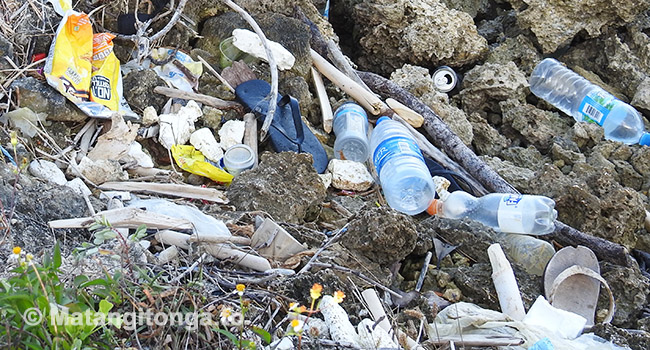
Concerning: Businesses recognized for tackling plastic pollution, Matangi Tonga Online 15 Mar. 2021
Personally I place big question marks at the choice of some of the businesses mentioned in this article. I do not have the experience with them myself that they seriously try to avoid or reduce using plastic bags. But aside from that, those who are really serious have my full support.
How often it still happens that I come in a bigger shop, and need something that is already packed in plastic from the factory. The shop assistant directly puts it in a plastic bag. At the checkout the cashier puts it in yet another plastic bag. And with some bad (?) luck a final assistant puts everything in yet another bag. Or even worse, yet another bag around it if the shopping is heavy and may tear a single bag. Even in less extreme cases, almost all shops, whatever I buy, without asking, they put it in plastic bag and are surprised if I say I do not need that.
Nowadays when I sweep my garden, sometimes it seems to me that I sweep up more plastic bags, which others have left to fly, than leaves. When visiting the beach, the same again, although in that case it are more the empty water bottles which people just throw away in the sand when they have no need of them any more.
Why?
Because that is the way nature has made us. ...Do not bother with what is behind you.
Unfortunately that does not work for plastic bags. They do not decompose. And that is thus why we have to develop new habits. ...They are to be enforced. Singapore police methods would be one way to get quickly results. Education at schools is another way, especially in the way China is doing it upon the Uighurs. But maybe both methods would not be popular here in Tonga. Normal education is the way to go, but it will take many years.
By the way, why Tonglish again (= Tonganised English or Anglicised Tongan)? The proper expression would be “Tauʻi e veve milemila”.
Which type of bag will be worse?
Some people would claim that to forbid the import of these onetime use plastics into Tonga would be a solution. In fact many of the neighbouring countries already do that. Let the people use paper bags, or reusable cotton bags and the like. I disagree.
First bags are to be made, that takes raw materials and uses energy resulting in CO₂ emissions and other obnoxious materials. And after use they are to be disposed of which may produce yet other obnoxious products. They all take a toll on the environment. Which type of bag will be worse? For sure, you would think, reusable bags will win when looking for the environmental impact per usage?
Have a look this movie: https://www.youtube.com/watch?v=JvzvM9tf5s0. You will be surprised.
Then this does even not consider that reusable bags are not very suited for transporting may products, such as meat. Because the use of water and soap to wash out the blood from the bag every time afterwards is a additional burden. For these types of products the onetime use plastic bag is unbeatable.
Lazyness of people is the problem
So if used wisely plastic has enough advantages in order not to want to do away with it. It is de lazyness of people which is the problem.
I still get people in my shop who buy an item that is easily carried, but claim that they are unable to do so if it is not in a plastic bag.
On the market you buy a pineapple and they put it in a plastic bag. Yes, it is easier for the farmer than to make a kato hunga, but it is stupid because the sharp leaves of the pineapple directly shred the bag. In these cases you should have brought your reusable shopping bag.
Manufacturers can help. Responsible manufacturers pack their products, if possible, in carton boxes instead of plastic...and even the products they make are designed to be recyclable and as environmentally friendly as possible. But that comes at a price.
Again, being conscious about the environment needs some effort. It is not for lazy people.
Firitia, Tauʻolunga komipiuta



